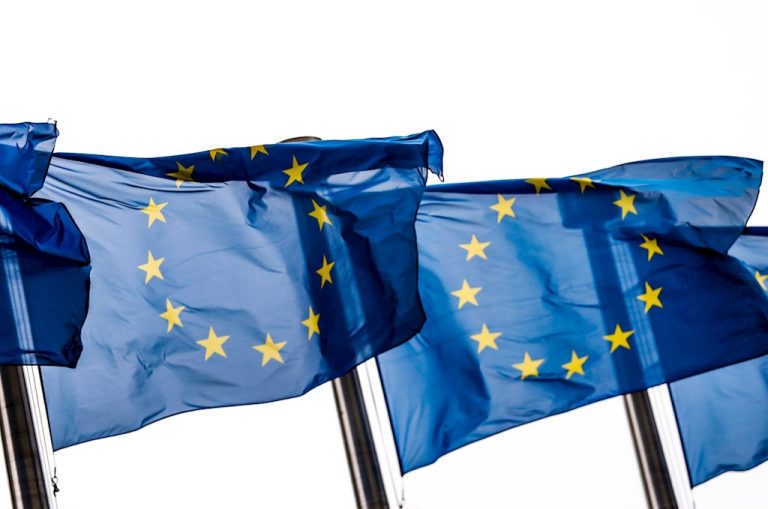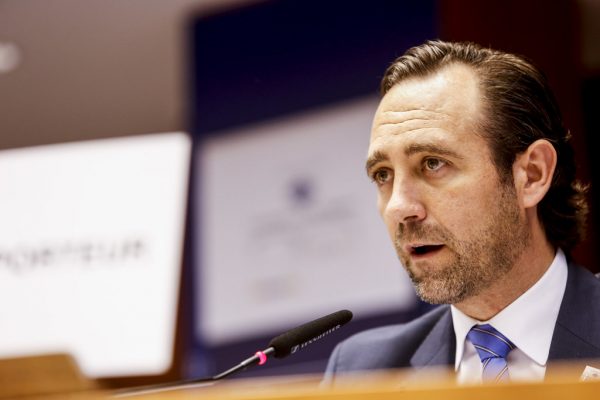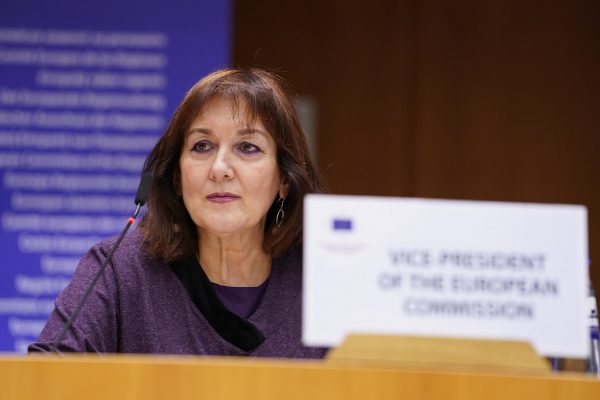9 de octubre 2020

The Return of the Military

PUBLICIDAD 1M
PUBLICIDAD 4D
PUBLICIDAD 5D
The resolution passed with 609 of the 694 European deputies. It comes in response to the newly proposed repressive laws.

On October 8th, the European Parliament approved a request to broaden the sanctions against functionaries of the Ortega-Murillo regime. The sanctions include the presidential couple, accused of ordering repressive attacks against those opposing them. This ongoing situation began with the explosion of social protest in April 2018.
The resolution passed with 609 votes in favor, of the 694 possible (88%) in the European Parliament. There were 21 votes against it, and 64 abstentions.
Dubravka Suica, vice president of the European Commission, warned about the new laws the Ortega regime proposes to ram through. These, she stated, would “probably affect” the European Union’s programs of cooperation with Nicaragua.
On Wednesday, October 7, the internet news program Esta Semana broadcast an interview with Spanish deputy Jose Ramon Bauza. The interview was transmitted via YouTube and Facebook Live. Bauza explained that the European Parliament’s resolution was in response to the new laws Ortega is proposing. The “Law for the Regulation of Foreign Agents” and the “Special Cybercrimes Law” are accompanied by a proposed Constitutional reform. The latter would establish life in prison as punishment for “hate crimes”. The regime offered no clear definition for these, but they’ve commonly used this language to attack the opposition.
“To me, there were three objectives [for the Parliament]. First was the debate. (…) Second, the imposition of sanctions against Ortega and Murillo, who initiated these laws and are primarily responsible for them. Thirdly, the initiation of motions to suspend Nicaragua from the [Association] Agreement between Central America and the EU. We’re telling the dictators that if they go down that road, we’ll activate motions to suspend that Agreement,” Bauza stated.

Jose Ramon Bauza, Spanish Eurodeputy. Photo: Wim Daneels / Regional Committee
The Parliament still hasn’t defined the specific nature of the sanctions against Ortega and Murillo. That decision is the responsibility of the European Union Council.
In May 2020, the EU sanctioned the director of Nicaragua’s National Police, Francisco Diaz, Ortega’s in-law. They also imposed sanctions on Luis Perez Olivas, head of the Directorate that controls the infamous El Chipote jail. Other police officials the EU sanctioned include Justo Pastor Urbina, Special Operations Head, and Ramon Avellan, Assistant Chief of Police. Finally, the European Union sanctioned close Ortega collaborator Nestor Moncada Lau and former Minister of Health Sonia Castro.
The new resolution reads in part: “In view of continued grave abuses and violations of human rights, if the proposed ‘Law for Regulation of Foreign Agents’, the ‘Special Law of Cyber Crime’, and the ‘Law Against Hate Crimes’ are adopted, if the government of Nicaragua continues lacking willingness to launch a national dialogue for a proper electoral reform, and the repression of civil society and the democratic opposition in Nicaragua continues, [Parliament] requests that the Council quickly enlarge the list of individuals and entities sanctioned, including the President and Vice-President, taking special care not to harm the Nicaraguan people.”
Juan Sebastian Chamorro, Executive director of the Civic Alliance, commented on the European Parliament’s vote. “With (…) 609 votes in favor, the European Parliament approved a resolution seeking to sanction Ortega and Murillo. In addition, they’re invoking the democratic clause. We welcome this resolution in support of the Nicaraguan people in their struggle for freedom, justice and democracy.” Chamorro’s comments appeared on his Twitter account.
During his interview on Esta Noche, Jose Bauza stressed that the requested sanctions are directed specifically against Ortega and Murillo. There approval will come in such a way as to avoid any negative effect on the Nicaraguan population. The European Deputy assured they know the regime is constantly alleging that the sanctions affect the entire country. However, he clarified, sanctions applied to the regime’s functionaries in no way harm the population.
However, he added that there is one sanction that could have a general effect. Suspending the Nicaraguan portion of the Association Agreement between the European Union and Central America would affect the Nicaraguan population. The Parliament resolution establishes this possibility if the trio of laws is approved.
“This measure is pending if the dictators go forward with those laws. I hope they won’t be approved. If so, however, we’re asking to initiate a motion to suspend Nicaragua from the Accord. The Association Accord is an agreement that governs the ties between Central America and the European Union. We wouldn’t want to arrive at that situation, since those feeling the consequences would be families, businesses, and established companies. Unfortunately, the primary people responsible for that decision are the dictators, if they approve the laws,” Bauza warned.
The European Union already imposed sanctions on other regimes, such as that of Nicolas Maduro in Venezuela. Maduro still maintains a tight grip on power and has closed off any possibility of a democratic transition of power.
Bauza said even though those sanctions haven’t had any effect on the democratization of Venezuela, “we must keep pressuring.” “We must continue imposing sanctions, preserving and facilitating the rule of law. Regarding Nicaragua, we can’t allow ourselves to consider desisting just because it hasn’t worked in one place (Venezuela).”
The European deputy recalled that “for years”, the Ortega- Murillo couple “have laughed” at the agreements they’ve signed with the EU. This time around, he feels, they’re going to show them that they “must comply” with the documents they sign.
Dubravka Suica, vice president of the European Commission issued a warning in Brussels about Nicaragua’s proposed “Foreign Agents” law. She stated that this law the Nicaraguan government is preparing “will probably affect” the EU’s programs of cooperation with Nicaragua.

Dubravka Suica, vice president of the European Commission. Photo: Patrick Mascart, Philippe Buisson / European Union
“Given the renewed tendency of persecution, harassment and intimidation, the European Union is following the possible adoption [of these laws]. The Law to Regulate Foreign Agents and the Cybercrimes Law could be used to increase pressure on Nicaraguan civil society.” Suica issued this explanation during the European Parliament’s debate.
This legislation, Suica added, “could open the door to further restrict the social and political rights of individuals, society and the media.”
“It will probably affect our cooperation programs and the associated human rights commitments and obligations of the Nicaraguan government,” he predicted.
Suica informed the deputies of contacts between European officials and Nicaragua’s foreign Ministry. The head of the European delegation to Nicaragua and member states with representation there have formally communicated their “concern”. They have also contacted the Ministry “to investigate further the draft of the law.”
Suica insisted that Nicaraguan citizens “should freely exercise their freedom of association.” Also, NGOs “should operate in an atmosphere conducive to the promotion and protection of human rights and basic freedoms.”
The European Parliament’s resolution requests that a delegation from the chamber travel to Nicaragua. Such a delegation could continue monitoring the situation in the country. The Parliament urged the Nicaraguan government to permit “their unhindered entry, with access to all involved parties and buildings.”
Such a visit would help put more pressure on the Ortega-Murillo regime, the Parliament deputies maintained. It would also enhance the actions that the opposition is carrying out on an internal level.
On October 6, families of the political prisoners participated in a teleconference with several of the European deputies. Seven mothers and four activists gathered in a hotel in Managua’s Las Colinas sector for this virtual encounter. The Organization of April Victims later denounced the surveillance of the Managua police and paramilitary throughout the event. According to the organization, the hotel was surrounded by some five police patrol vehicles and an undetermined number of paramilitary. The names of the participating deputies were not released.
The European Parliament also requested assistance from the European Service for Foreign Action and the EU human rights representative. They urged the agencies to “continue and intensify their material and technical assistance to Nicaraguan human rights advocates and independent media.” Further, they reached out to the EU delegation and member states with diplomatic missions in the country. These were asked to “fully apply the EU guidelines regarding human rights advocates.”
In January 2019, a delegation of European deputies visited Nicaragua. They met with victims and members of civil society and the opposition. They also managed to enter the regime’s jails to converse with several the political prisoners. In this way, they were able to verify their prison conditions.
Bauza recalled the commitments implicit in the Agreement of Association between the EU and the Central American countries. In light of these, Nicaragua should respect and consolidate the principles of democracy, the rule of law, and human rights.
These efforts join other calls that may come out of the upcoming session of the Organization of American States. The latter group will be meeting in the next weeks. They are expected to add their voice to demands for transparent, observed elections in Nicaragua, 2021.
This article includes information from the EFE press agency.
PUBLICIDAD 3M
PUBLICIDAD 3D